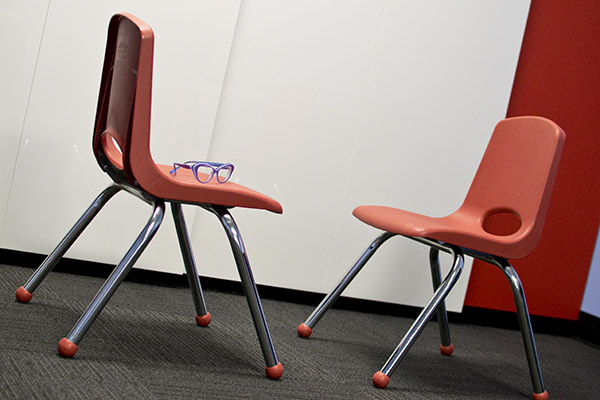
As a young student counselor we were required to role-play with fellow students as practice for the techniques we learned in class. It always felt very contrived—we’d anxiously move our chairs face-to-face with one another, then either concoct a fake situation or choose to act out an issue or a problem from our real lives. One of us serving as the therapist, while the other as the client.
Later in internships, we were required to be supervised by a doctoral level psychiatrist or psychologist. They would review our cases, and progress with the clients’, often addressing how some of our own issues were coloring how we were reacting as therapists to the case and personality at hand. Therapists are human of course—they are not exempt from personal hang-ups, triggers or issues, however, it is always our job to keep those things in healthy check so that we can be a somewhat neutral sounding board of non-judgmental support and care for our clients. Without this neutrality we, as therapists, can do more harm than good.
So, there have been times in my adult life where I have felt a need to reach out for therapy support . Oddly, I put off the need for help because I feared it would not be helpful for me. Crazy as it sounds—I worried I might analyze the therapist, see through their techniques or, worse yet, see their superior wisdom or professional inadequacies. Really, it was just my deep insecurity with being vulnerable to the process.
The details of when this therapist went to therapy still remain remarkably vivid:
 I reluctantly drag myself to the therapist’s office. Inside, I am dreadfully quivering—you know, where your hands are sweaty and your insides are turned upside down. I nervously search the office numbers for my therapist’s name. “What on earth am I so afraid of?” I mutter to myself. I physically shake my shoulders and mentally tell myself to loosen up, this is a good thing, this is for you, silly—this is your craft. You believe in it.
I reluctantly drag myself to the therapist’s office. Inside, I am dreadfully quivering—you know, where your hands are sweaty and your insides are turned upside down. I nervously search the office numbers for my therapist’s name. “What on earth am I so afraid of?” I mutter to myself. I physically shake my shoulders and mentally tell myself to loosen up, this is a good thing, this is for you, silly—this is your craft. You believe in it.
I enter the waiting area and sign in. My therapist calls me back. I immediately start to tap into her energy—how she walks, how she enters the room, her voice. I wonder if my clients do the same with me? It’s really a vulnerable place to be —and I am seeing what it’s like. This is good, I think to myself…. to feel what it feels like to be on the other side.
Moments later, inside the therapy room, a pervasive silence fills the room and she begins to speak. I am fixated on her lips, noting the language she uses, her careful way of questioning, and her gentle and respectful presence… even how she sits with an open inviting posture. I look at her awards, her training certificates, her personality tastefully exhibited in the room’s décor. I am reassured and thankful for my colleague’s referral so far—and this is what is going around in my head. I actually think this fellow therapist may be able to help me!
Session after session I returned to work on myself and all the while I struggled not to analyze her. I’ll admit that was hard. I constantly felt pulled towards questioning her techniques or processes, and had to focus on allowing her in to help me. Several times I got angry with her for insinuating things that were my really my truth despite my blatant denial. I had experienced this so many times in conducting therapy—countless times. It doesn’t always feel great to realize your truth—especially if you don’t like it and need to change it.
 So, here’s what I learned on the other side:
So, here’s what I learned on the other side:
I cannot know everything regardless of my degrees, education and experience. The neutral, safe, non-judgmental relationship in therapy is immeasurably helpful. You’d be surprised what you see when someone holds up the mirror for you. I have always believed that is what a good therapist does.
You can be your own worst enemy or greatest source of strength. Sometimes that switch gets flipped for any variety of reasons and you need help switching it back.
A skilled, trained therapist (if they are good) can see into your personality and history fairly quickly and help identify patterns that keep you stuck. Most of what we deal with in life revolves around being stuck in a pattern, emotion, relationship etc. and that does not serve us well.
Therapy is a beautiful and freeing process when done properly. It can help you understand yourself in ways you rarely could on your own.
Now I can say I am a true believer in a way I couldn’t before, and I have a greater empathy for the courage it takes for my clients to face themselves in therapy…. I am grateful for the experience on many levels.
On my desk I have always kept a beautiful antique handheld mirror that I’ve had since childhood. It graced my bureau every single day. I keep it on my desk to remind me that I am a vehicle through which others seek change. The mirror is my tool—I must take really good care of me to help others.
Be courageous. Don’t be afraid of the mirror. I truly speak from both vantage points now—from bravely gazing into my reflection and as the one holding up the mirror for others.



